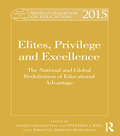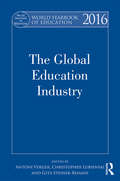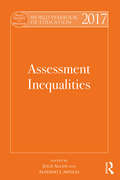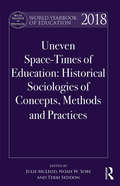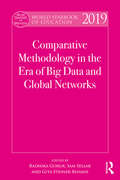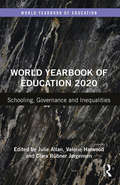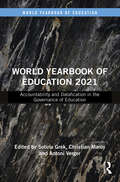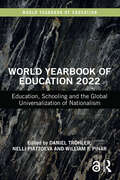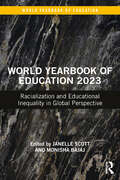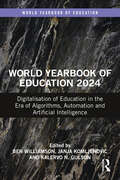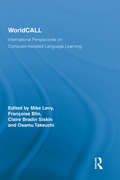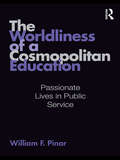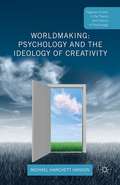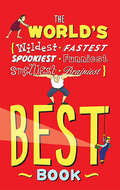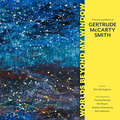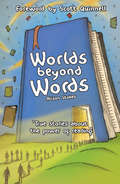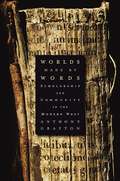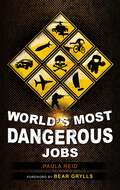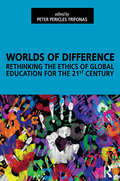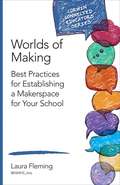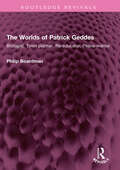- Table View
- List View
World Yearbook of Education 2015: Elites, Privilege and Excellence: The National and Global Redefinition of Educational Advantage (World Yearbook of Education)
by Stephen J. Ball Agnès Van Zanten Brigitte Darchy-KoechlinThis latest volume in the World Yearbook of Education Series focuses on educational elites and inequality, focusing particularly on the ways in which established and emergent groups located at the top of the social hierarchy and power structure reproduce, establish or redefine their position. The volume is organized around three main issues: analyzing the way in which parents, students and graduates in positions of social advantage use their assets and capitals in relation to educational strategies, and how these are different for old and new and cultural and economic elites; studying how elite institutions have adapted their strategies to take into account changes in the social structure, in policy and in their institutional environment and exploring the impact of these strategies on educational systems at the national and global levels; mapping the new global dynamics in elite education and how new forms of 'international education' and 'transnational cultural capital' as well as new global educational elite pathways shape elite students’ identities, status and trajectories. Making use of a social and an institutional approach as well as a focus on practices and policies, the volume draws on research conducted on secondary schools and on higher education. In addition, the global contributions within the book allow for a comparison and contrast of situations in different countries. This results in a comprehensive picture of common processes and national differences concerning advantage and excellence and a thorough examination of the impact of globalization on the strategies, identities and trajectories of elite groups and individuals alongside more general cultural and economic processes.
World Yearbook of Education 2016: The Global Education Industry (World Yearbook of Education)
by Antoni Verger Christopher Lubienski Gita Steiner-KhamsiThis latest volume in the World Yearbook of Education series examines the global education industry both in OECD* countries as well as developing countries, and presents the works of scholars based in different parts of the word who have significantly contributed to this area of research. Focusing on the areas of cross-over in public-private partnerships in education, WYBE 2016 critically examines the actors and factors that have propelled the global rise of the education industry. Split into three key sections, Part I explores how education agendas are shaped; Part II considers the private financing of education and the export of school improvements to professional consultancies; and Part III analyses new market niches, such as low-fee private schooling and for-profit education provisions. The book draws upon case studies of many global organizations, including: The Bill and Melinda Gates Foundation Pearson Affordable Learning Fund Bridge International Academies Teach for All Omega Schools Co-edited by three internationally renowned scholars, Antoni Verger, Christopher Lubienski and Gita Steiner-Khamsi, WYBE 2016 will be a valuable resource for researchers, graduates and policy makers who are interested in the global education industry. *Convention on the Organisation for Economic Co-operation and Development.
World Yearbook of Education 2017: Assessment Inequalities (World Yearbook of Education)
by Alfredo J. Artiles Julie AllanThis latest volume in the World Yearbook of Education series examines the relationship between assessment systems and efforts to advance equity in education at a time of growing inequalities. It focuses on the political motives behind the expansion of an assessment industry, the associated expansion of an SEN industry and a growth in consequential accountability systems. Split into three key sections, the first part is concerned with the assessment industry, and considers the purpose and function of assessment in policy and politics and the political context in which particular assessment practices have emerged. Part II of the book, on assessing deviance, explores those assessment and identification practices that seek to classify different categories of learners, including children with Limited English Proficiency, with special needs and disabilities and with behavioural problems. The final part of the book considers the consequences of assessment and the possibility of fairer and more equitable alternatives, examining the production of inequalities within assessment in relation to race, class, gender and disability. Discussing in detail the complex historical intersections of assessment and educational equity with particular attention to the implications for marginalised populations of students and their families, this volume seeks to provide reframings and reconceptualisations of assessment and identification by offering new insights into economic and cultural trends influencing them. Co-edited by two internationally renowned scholars, Julie Allan and Alfredo J. Artiles, World Yearbook of Education 2017 will be a valuable resource for researchers, graduates and policy makers who are interested in the economic trends of global education assessment.
World Yearbook of Education 2018: Uneven Space-Times of Education: Historical Sociologies of Concepts, Methods and Practices (World Yearbook of Education)
by Julie McLeod Noah W. Sobe Terri SeddonThis latest volume in the World Yearbook of Education Series considers changing space-times of education by asking how they become unevenly textured as our worlds globalise, horizons shift and familiar points of reference melt and are remade. Acknowledging the reach of economic and cultural change, digital communication, geopolitics and persistent inequalities, the chapters trace processes that are re-making education and societies. Examining the depth of their impact on practices, methods and concepts reveals the significance of knowledge-building and socially embedded forms of reasoning in emerging patterns of educational governance, pedagogic and policy reforms as well as in lived understandings of self and social worlds. The organisation of the collection into three sections – Making Spaces, Troubling Temporalities, and Mobility and Contexts – begins to map out an ambitious project. It calls on education researchers and professionals to write the present as history by grasping the socio-spatial, historical and political dimensions and effects that frame, form and filter the educational present. This research calls for a revitalised historical sociology and novel forms of comparative education that can provide productive insights, inform creative problem solving and suggest practical directions for education. This agenda recognises: the unevenness of educational space-times the making of education as a social institution the persistence and effects of social embeddedness, eventful space, situated knowledge, and geosocial thinking the present as history and multiple temporalities in education different registers of transformation that become visible through lenses such as identity, work, citizenship and mobility. The World Yearbook of Education 2018 continues the project of compiling worldwide research on globalising education. These volumes offer a powerful commentary on how and why space-times of education are changing and emphasise the importance of forms of knowledge that materialise categories of professionals, policies and practices. This volume will be of interest to academics, professionals and policymakers in education and social policy, and also to scholars who engage in historical studies of education and debates about the socio-material formations that contribute to educational inequalities and dynamics of difference.
World Yearbook of Education 2019: Comparative Methodology in the Era of Big Data and Global Networks (World Yearbook of Education)
by Radhika Gorur Sam Sellar Gita Steiner-KhamsiDigital methodologies, new forms of data visualization and computer-based learning and assessment are creating new challenges as well as opportunities for scholars in educational research. The World Yearbook of Education 2019 explores this highly relevant topic, opening a new discussion about the various conceptual and methodological challenges and opportunities in contemporary educational research. This volume explores contemporary methods of inquiry, with chapters organized around four topics of enduring interest in this field: impacts, patterns, relations and contexts. The World Yearbook of Education 2019 comprises contributions from internationally renowned scholars exploring novel concepts and methodologies in grappling with contemporary empirical phenomena in educational research. Vital questions such as how we understand the technological developments that are creating new possibilities for and demands on education, and how we make sense of complex cases that cut across multiple nations, are discussed. This newest addition to the prestigious World Yearbook of Education series provides a fascinating read for scholars in the fields of education policy and comparative education. It is not only a useful resource for educational researchers and policy makers examining new trends and emerging issues, but would be of interest to graduate students exploring innovative methodologies, particularly in the study of education and education policy.
World Yearbook of Education 2020: Schooling, Governance and Inequalities (World Yearbook of Education)
by Julie Allan Valerie Harwood Clara JørgensenA timely contribution to the debate on educational governance and equality, the World Yearbook of Education 2020 documents the significant changes that have occurred in the last 20 years reflecting a widespread shift from government to governance. Considering school context as well as specific school responses around the emergence of particular forms of governance, this book presents and contextualises a clear historical account of governance and accountability within schooling. Organised into three sections covering: Changing contexts of school governance; stakeholders and ‘responsibilisation’; and radical governance, carefully chosen contributors provide global insights from around the world. They consider educational outcomes and closing the inequality gap and they document radical forms of governance, at local level, which have sought to create more equitable governance, intelligent accountability and greater involvement of key stakeholders such as students. Providing a series of provocations and reminders of the possibilities that remain open to us, the World Yearbook of Education 2020 will be of interest to academics, professionals and policymakers in education and school governance, and any scholars who engage in historical studies of education and debates about educational governance and equality.
World Yearbook of Education 2021: Accountability and Datafication in the Governance of Education (World Yearbook of Education)
by Sotiria Grek Christian Maroy Antoni VergerProviding a comprehensive introduction to the topic of accountability and datafication in the governance of education, the World Yearbook of Education 2021 considers global policy dynamics and policy enactment processes. Chapters pay particular attention to the role of international organizations and the private sector in the promotion of performance-based accountability (PBA) in different educational settings and at multiple policy scales. Organized into three sections, chapters cover: the global/local construction of accountability and datafication; global discourse and national translations of performance-based accountability policies; and enactments and effects of accountability and datafication, including controversies and critical issues. With carefully chosen international contributions from around the globe, the World Yearbook of Education 2021 is ideal reading for anyone interested in the future of accountability and datafication in the governance of education.
World Yearbook of Education 2022: Education, Schooling and the Global Universalization of Nationalism (World Yearbook of Education)
by William F. Pinar Daniel Tröhler Nelli PiattoevaThe latest volume in the World Yearbook of Education Series explores the relationship between education and the globally prevalent principle of nationalism. This book identifies the diverse ways in which educational policies, discourses, curricula and pedagogy embed and promote the concept of "the nation" both historically and in the age of globalization. By challenging accounts owed to the discourse of "globalization" which conceal the presence of national epistemologies and interests in education, this book offers important insights into the role of education in making nationalism one of the most enduring and yet easily obscured forces of our time. Organized into four sections, this book looks at the following main issues: Historical (re)production of the nation considers how countries consider and reproduce their national identity and how this is built on their history. Hegemonic aspirations and interventions examines how instruction technologies developed during the Cold War have been propagated and disseminated around the world, how the development of educational policy based on the human capital theory emerged, and analyzes the extent to which tech companies are intent on establishing an imperial order of learning. Imperial policies and resurgences of nationalisms explores how global or imperial policies have been indulged in different parts of the world and how new forms of nationalism have been emerging. Paradoxes, inconsistencies, and a self-reflection focuses on nations acting imperially as sites of domestic injustices, addresses unresolved paradoxes between the global and the national and includes a historically informed critical review of the World Yearbooks of Education. Bringing together the voices of researchers from around the globe, The World Yearbook of Education 2022 is ideal reading for anyone interested in learning how nationalism has affected the expansion of education systems and how its imperial aspirations are currently affecting education policy and practice.
World Yearbook of Education 2023: Racialization and Educational Inequality in Global Perspective (World Yearbook of Education)
by Janelle Scott Monisha BajajThe World Yearbook of Education 2023 centers on the intersection of racialization, inequality, and education. It critically examines how racial formation and its associated logics about citizenship, belonging, justice, equality, and humanity manifest in early childhood education, primary, secondary, and higher education, as well as non-formal, community-based education settings. The chapters offer multisited perspectives into how racialization has and continues to shape educational inequality, with an eye towards the agency and resistance of youth and communities in contesting such forms of domination and marginalization. Across three sections, the book examines how forces of imperialism, white supremacy, and colonization have shaped racialization in distinct locations and how education was historically utilized as a site for both the creation and/or reification of difference. It reveals the lingering effects of processes of racialization in distinct locations globally and their intersections with educational policies, ideologies, systems, and realities. Inviting readers to learn, reflect, and engage with the layered and complex realities of racialization and inequality in education across the globe, World Yearbook of Education 2023 is a timely and important contribution to discussions of racialization and provides the field with a robust foundation for future critical inquiry and engagement with the themes of race, racialization, inequality, and education.
World Yearbook of Education 2024: Digitalisation of Education in the Era of Algorithms, Automation and Artificial Intelligence (World Yearbook of Education)
by Ben Williamson Janja Komljenovic Kalervo N. GulsonProviding a comprehensive, global overview of the digitalisation of education, the World Yearbook of Education 2024 examines the ways advanced digital technologies are transforming educational practices, institutions and policy processes.Establishing a critical research agenda for analysing the digitalisation of education, the carefully selected chapters in this collection interrogate the current impacts of new digital technologies, emerging controversies over emerging data practices and future implications of algorithmic systems, automated decision-making and AI in education. Organised into four sections, the contributions in the collection examine the following: The historical, scientific and technical foundations of contemporary digitalisation in education The political and economic dynamics that underpin the education technology industry and new platform models of education How algorithms, automation and AI support new modes of data-driven governance and control of education systems Controversies over the inequitable effects of digitalisation in education, and proposals for data justice, ethics and regulation This resource is ideal reading for researchers, students, educational practitioners and policy officials interested in understanding the future of digital technologies in education.
WorldCALL: International Perspectives on Computer-Assisted Language Learning (Routledge Studies in Computer Assisted Language Learning)
by Mike Levy Françoisee Blin Claire Bradin Siskin Osamu TakeuchiAs technological innovation continues to affect language pedagogy, there is an increasing demand for information, exemplars, analysis and guidance. This edited volume focuses on international perspectives in Computer-Assisted Language Learning (CALL) in all of its forms, including Technology Enhanced Language Learning, Network-Based Language Learning, Information and Communication Technologies for Language Learning.
The Worldliness of a Cosmopolitan Education: Passionate Lives in Public Service (Studies in Curriculum Theory Series)
by William PinarPinar positions himself against three pressing problems of the profession: the crime of collectivism that identity politics commits, the devaluation of academic knowledge by the programmatic preoccupations of teacher education, and the effacement of educational experience by standardized testing. A cosmopolitan curriculum, Pinar argues, juxtaposes the abstract and the concrete, the collective and the individual: history and biography, politics and art, public service and private passion. Such a curriculum provides passages between the subjective and the social, and in so doing, engenders that worldliness a cosmopolitan education invites. Such worldliness is vividly discernible in the lives of three heroic individuals: Jane Addams (1860-1935), Laura Bragg (1881-1978), and Pier Paolo Pasolini (1922-1975). What these disparate individuals demonstrate is the centrality of subjectivity in the cultivation of cosmopolitanism. Subjectivity takes form in the world, and the world is itself reconstructed by subjectivity’s engagement with it. In this intriguing, thought-provoking, and nuanced work, Pinar outlines a cosmopolitan curriculum focused on passionate lives in public service, providing one set of answers to how the field accepts and attends to the inextricably interwoven relations among intellectual rigor, scholarly erudition, and intense but variegated engagement with the world.
Worldmaking: Psychology and the Ideology of Creativity (Palgrave Studies in the Theory and History of Psychology)
by Michael Hanchett HansonMichael Hanchett Hanson weaves together the history of the development of the psychological concepts of creativity with social constructivist views of power dynamics and pragmatic insights. He provides an engaging, thought-provoking analysis to interest anyone involved with creativity, from psychologists and educators to artists and philosophers.
The World's Best Book: The Spookiest, Smelliest, Wildest, Oldest, Weirdest, Brainiest, and Funniest Facts
by Jan PayneWith all of the books in the world, this one is the best! With a multitude of did-you-knows, accompanied by hilarious illustrations, page after page is packed with the best entertainment and education. For kids craving to jam their brains with odd and intriguing facts, here's a banquet-stuffed with the fastest, brightest, longest, funniest, weirdest, wildest, wettest, smelliest, brainiest, and fascinating-est things in the world!
Worlds beyond My Window: The Life and Work of Gertrude McCarty Smith
by Thomas R. Brooks Pat Pinson Stephen Rosenberg Rick WilemonArtist, columnist, and poet Gertrude McCarty Smith (1923–2007) of Collins, Mississippi, carried herself as a demure and proper southern lady, yet this was deceiving as she was a prolific, creative trailblazer who had collectors and dedicated readers from coast to coast, and even in Europe. She grew up during the Great Depression with only some vivid storytelling and pictures from the family Bible to inspire and kindle her artistic spirit. However, at the age of ten, her career launched when her grandmother coaxed her with a box of crayons to milk the family cow—her seventy-year love affair with the arts was born. Over the years, she would express her creativity in many forms, resulting in thousands of paintings, sculptures, songs, poems, and newspaper columns and along the way a variety of artful cakes, as she ran a celebrated twenty-five-year cake business. Her art appeared in all shapes, sizes, materials, and “eatability.” For most of her early career, Gertrude dabbled with a variety of styles—with subjects mostly centered around life in rural Mississippi and her spiritual life. But in 1980 at the age of fifty-seven, she attended her first Mississippi Art Colony at Camp Jacob in Utica, Mississippi. Over the next fifteen years, she would make her pilgrimage twice a year to be inspired by celebrated guest instructors from around the nation and connect with fellow artists. The Colony was a major catalyst, exposing her to new styles, giving her encouragement and freedom to experiment. Gertrude said of the Colony, “I never knew anything about abstract art, but it fascinated me to no end. Abstract art to me is like a beautiful melody without words. In mixed media, I am in another world and often am surprised at the piece that evolves from the torn watercolor papers. The effect is a kaleidoscope of colors that makes the retinas dance.” This book features more than 150 images; a dozen poems; insightful essays from New York art dealer Stephen Rosenberg, acclaimed southern cultural scholar and curator Pat Pinson, and artist, curator, and instructor Rick Wilemon; along with a foreword by Tommy King, president of William Carey University; and a chronicle of her life’s journey by her son-in-law, Thomas R. Brooks. As Rosenberg has said, “Gertrude Smith is a remarkable and authentic American woman who teaches us that talent and creativity combined with a humanistic spirit is both a state of mind and a state of grace—at any age.” Book proceeds will benefit the Gertrude McCarty Smith Foundation for the Arts to bring access and passion for literature, performance, and visual arts to children in underserved communities throughout Mississippi.
Worlds Beyond Words: True Stories About the Power of Literacy (Quick Reads Ser.)
by Alison StokesA collection of real-life stories from people who have improved their lives through better literacy. Foreword by Scott QuinnellSome people take the power of words for granted. But for the thousands of people who struggle with poor literacy, words can be scary things. The men and women featured in this book have overcome their fears to improve their reading later in life. Whether they are famous businessmen or sports stars, teenagers in care, middle-aged mums, young soldiers or refugees forced to flee bloodshed in their own home countries, they all share a common desire to learn.Their stories will inspire others to follow journeys of their own.Alison Stokes is a writer and journalist, who writes for national magazines in the UK and US and regional newspapers in Wales. For many years she was a features editor at Trinity Mirror’s South Wales Echo. She also works as a part-time university lecturer in journalism and publishing manager.
Worlds Beyond Words: True Stories About the Power of Literacy (Quick Reads)
by Alison StokesA collection of real-life stories from people who have improved their lives through better literacy. Foreword by Scott QuinnellSome people take the power of words for granted. But for the thousands of people who struggle with poor literacy, words can be scary things. The men and women featured in this book have overcome their fears to improve their reading later in life. Whether they are famous businessmen or sports stars, teenagers in care, middle-aged mums, young soldiers or refugees forced to flee bloodshed in their own home countries, they all share a common desire to learn.Their stories will inspire others to follow journeys of their own.Alison Stokes is a writer and journalist, who writes for national magazines in the UK and US and regional newspapers in Wales. For many years she was a features editor at Trinity Mirror’s South Wales Echo. She also works as a part-time university lecturer in journalism and publishing manager.
The World's Biggest Classroom (Fountas & Pinnell Classroom, Guided Reading Grade 4)
by Alicia FenwickAn Unusual School Australia is a HUGE country. Many families live in remote areas, far apart from one another. So how do the children in these families go to school together? NIMAC-sourced textbook
Worlds Made By Words: Scholarship And Community In The Modern West
by Anthony GraftonItalian cinemas after the war were filled by audiences who had come to watch domestically-produced films of passion and pathos. These highly emotional and consciously theatrical melodramas posed moral questions with stylish flair, redefining popular ways of feeling about romance, family, gender, class, Catholicism, Italy, and feeling itself. The Operatic and the Everyday in Postwar Italian Film Melodrama argues for the centrality of melodrama to Italian culture. It uncovers a wealth of films rarely discussed before including family melodramas, the crime stories of neorealismo popolare and opera films, and provides interpretive frameworks that position them in wider debates on aesthetics and society. The book also considers the well-established topics of realism and arthouse auteurism, and re-thinks film history by investigating the presence of melodrama in neorealism and post-war modernism. It places film within its broader cultural context to trace the connections of canonical melodramatists like Visconti and Matarazzo to traditions of opera, the musical theatre of the sceneggiata, visual arts, and magazines. In so doing it seeks to capture the artistry and emotional experiences found within a truly popular form.
World's Most Dangerous Jobs
by Paula ReidDo you find yourself daydreaming about a glamorous occupation, such as a racing driver, an astronaut or a stunt double? This compelling book unravels the mysteries and exposes the pitfalls of the world’s most dangerous jobs, giving a fascinating insight into the working lives of those who regularly stare death in the face.
World's Most Dangerous Jobs
by Paula ReidDo you find yourself daydreaming about a glamorous occupation, such as a racing driver, an astronaut or a stunt double? This compelling book unravels the mysteries and exposes the pitfalls of the world’s most dangerous jobs, giving a fascinating insight into the working lives of those who regularly stare death in the face.
Worlds of Difference: Rethinking the Ethics of Global Education for the 21st Century
by Peter Pericles TrifonasThe varying interests of competing minority groups often part company with regard to how to achieve an equitable community. Worlds of Difference rethinks the traditional interpretation of the principle of educational equity in light of this difficulty. Theorists and educational practitioners influenced by many disparate schools of thought reflect upon the possibilities of a "curriculum of difference" in relation to questions of language, culture, and media at the forefront of global education issues today. Collectively, the authors argue that education in theory and practice must reawaken an ethical consciousness that affirms the negative values of difference, but still recognizes the uniqueness and particularity of each group.
Worlds of Making: Best Practices for Establishing a Makerspace for Your School (Corwin Connected Educators Series)
by Laura FlemingMakerspaces: Your questions answered here! Get the nuts and bolts on imagining, planning, creating, and managing a cutting-edge Makerspace for your school community. Nationally recognized expert Laura Fleming provides all the answers in this breakthrough guide. From inception through implementation, you’ll find invaluable guidance for creating a vibrant Makerspace on any budget. Practical strategies and anecdotal examples help you: Create an action plan for your own personalized Makerspace Align activities to standards Showcase student creations Use this must-have guide to painlessly build a robust, unique learning environment that puts learning back in the hands of your students!
Worlds of Making: Best Practices for Establishing a Makerspace for Your School (Corwin Connected Educators Series)
by Laura FlemingMakerspaces: Your questions answered here! Get the nuts and bolts on imagining, planning, creating, and managing a cutting-edge Makerspace for your school community. Nationally recognized expert Laura Fleming provides all the answers in this breakthrough guide. From inception through implementation, you’ll find invaluable guidance for creating a vibrant Makerspace on any budget. Practical strategies and anecdotal examples help you: Create an action plan for your own personalized Makerspace Align activities to standards Showcase student creations Use this must-have guide to painlessly build a robust, unique learning environment that puts learning back in the hands of your students!
The Worlds of Patrick Geddes: Biologist, Town planner, Re-educator, Peace-warrior (Routledge Revivals)
by Philip BoardmanFirst published in 1978, The Worlds of Patrick Geddes is a study of Patrick Geddes’ thought and action, his relationships and his life, as someone who defied labelling and who was years ahead of his contemporaries. The work of Patrick Geddes (1854-1932) is coming to be more and more widely appreciated, as his ideas on many diverse subjects are being gradually assimilated into the mainstream of modern thought. Geddes has been confidently labelled as a biologist, town-planner, sociologist and educator; but he was all of these and more. This book will be of interest to students of biology, urban planning and sociology.
